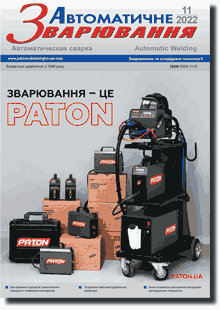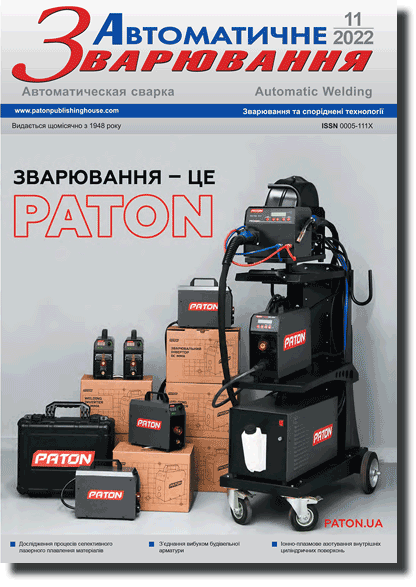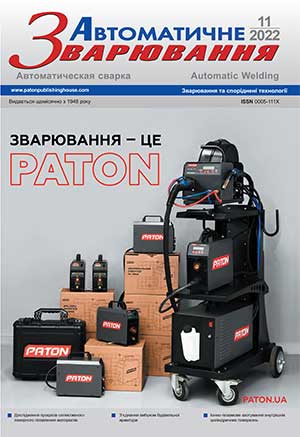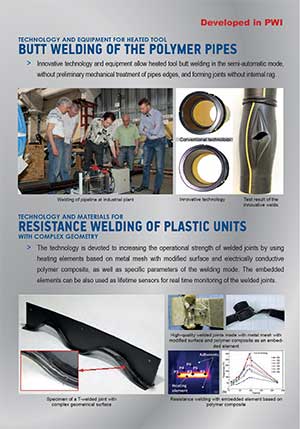| 2022 №11 (08) |
DOI of Article 10.37434/as2022.11.01 |
2022 №11 (02) |

"Avtomatychne Zvaryuvannya" (Automatic Welding), #11, 2022, pp. 7-11
Features of the influence of grain boundaries during δ-γ-transformation on the formation of welds metal structure (Review)
V.V. Holovko
E.O. Paton Electric Welding Institute of the NAS of Ukraine. 11 Kazymyr Malevych Str., 03150, Kyiv, Ukraine. E-mail: office@paton.kiev.ua
A review of the literary research results is presented, on the basis of which it is seen that the algorithm of modelling the structural composition of the metal, prediction of its mechanical properties should contain a description of reactions on the formation and development of dendritic structure. The models built on the description of reactions of γ-α-transformation do not provide the possibility for evaluation of the process of the structure formation as an integral complex – from the beginning of dendrites nucleation to the final composition of the microstructure. The results of the studies that have been performed in recent decades describing the impact of refractory compounds inoculation to melts of low-alloyed steels and, in particular, welding pool, on the development of nucleation processes, growth and decay of dendrites during metal crystallization. The abilities of the influence of inoculants on the primary structure formation are shown in order to improve the properties of welds metal. 22 Ref., 3 Fig.
Keywords: low-alloyed steel, welding pool, inoculation, dendrites, austenite, primary structure
Received: 08.09.2022
References
1. Phelan, D., Dippenaar, R. (2004) Instabilityof the delta-ferrite/ austenite interface in low carbonsteels: The influence of delta-ferrite recovery sub-structures. ISIJ International, 44, 2, 414-421. https://doi.org/10.2355/isijinternational.44.4142. Yin, H., Emi, T., Shibata, H. (1999) Morphological instability ofd-ferrite/g-austenite interphase boundaryin low carbon steels. Acta materials, 47, 5, 1523-1535. https://doi.org/10.1016/S1359-6454(99)00022-1
3. Babu, S.S., Vitek, J.M., David, S.A. et al. (2003) Characterization and prediction of austeniteformation and decomposition in steel welds. The Minerals, Metals & Materials Society, 1, 1-10.
4. Bhadeshia, H.K.D.H., Svensson, L.-E. (1993) Modelling the evolution of microstructurein steel weld metal. Mathematical Modelling of Weld Phenomena. Eds H. Cerjak, K. E. Easterling. Institute of Materials, London, pp. 109-182.
5. Strickland, J., Nenchev, B., Dong, H. (2020) On directional dendritic growth and primary spacing - A review. Crystals, 10, 627. https://doi.org/10.3390/cryst10070627
6. Richter, G., Rühle, M. (2006) Insight into the atomic-scale mechanism of liquid metal embrittlement. Appl. Phys. Lett. 89, 121911. https://doi.org/10.1063/1.2356322
7. Luo, J., Asl, M., Kiely, C.J., Harmer, M.P. (2011) The role of a bilayer interfacial phase on liquid metal embrittment. Science 23 Sep 2011, 333, 6050, 1730-1733. https://doi.org/10.1126/science.1208774
8. Cantwell P.R., Tang M., Dillon S.J. et al. (2014) Grain boundary complexions. Acta Materialia, 62, 1-48. https://doi.org/10.1016/j.actamat.2013.07.037
9. Borisov, V.T., Cherepanov, A.N., Predtechenskii, M.R., Varlamov, Yu.D. (2003) Effect of Wettability on the Behavior of a Liquid Drop after Its Collision with a Solid Substrate. Journal of Applied Mechanics and Technical Physics, 44, 803-808. https://doi.org/10.1023/A:1026231620036
10. Rohrer, G.S. (2011) Grain boundary energy anisotropy: a review. Journal of Materials Sciencev, 46, 5881-5895. https://doi.org/10.1007/s10853-011-5677-3
11. Mullins, W.W. (1957) Theory of thermal grooving. Journal of Applied Physics, 28, 333. https://doi.org/10.1063/1.1722742
12. Dillon, S.J., Rohrer, G.S. (2009) Mechanism for the development of anisotropic grain boundary character distributions during normal grain growth. Acta Materialia, 57, 1, 1-7. https://doi.org/10.1016/j.actamat.2008.08.062
13. Babu, S.S., Specht, E.D., David, S.A. et al. (2007) Time-Resolved X-ray diffraction investigation of austeniteand transformation to bainite. Proceedings of the 1st International Symposium on Steel Science (IS3-2007). The Iron and Steel Institute of Japan, 93-99.
14. Rohrer, G.S., Anthony, J.G., Rollett D. (2008) A Model for the origin of anisotropic grain boundary character distributions in polycrystalline materials. Applications of Texture Analysis, 17, 10. https://doi.org/10.1002/9780470444214.ch36
15. Cahn, J.W. (1977) Critical point wetting. The Journal of Chemical Physics, 66, 8. https://doi.org/10.1063/1.434402
16. Ebner C., Saam W.F. (1977) New phase-transition phenomena in thin argon films. Physical Review Letters, 38, 25, 1486-1489. https://doi.org/10.1103/PhysRevLett.38.1486
17. Straumal, B., Baretzky, B. (2004) Grain boundary phase transitions and their influence on properties of polycrystals. Interface Science, 12, 2-3, 147-155. https://doi.org/10.1023/B:INTS.0000028645.30358.f5
18. Chatain, D., Rabkin, E., Derenne, J., Bernardini, J. (2001) Role of the solid/liquid interface faceting in rapid penetration of a liquid phase along grain boundaries. Acta Materialia, 49, 7, 1123-1128. https://doi.org/10.1016/S1359-6454(01)00039-8
19. Porter, D.A., Easterling, K.E., Sherif, M.Y. (2009) Transformations in Metals and Alloys. Third edition. by Taylor & Francis Group. CRC Press is an imprint of Taylor & Francis Group. International Standard Book Number-13: 978-1-4398-8357-0 (eBook - PDF).
20. Yang, Y., Luo, S., Wang, P. et al. (2021) Multiphase field modeling of dendritic solidificationof low-carbon steel with peritectic phase transition. The Minerals, Metals & Materials Society and ASM International. https://doi.org/10.1007/ s11663-021-02297-1
21. Suito, H., Ohta, H., Morioka, S. (2006) Refinement of solidification microstructure and austenite grainby fine inclusion particles. ISIJ International, 46, 6, 840-846. https://doi.org/10.2355/isijinternational.46.840
22. Holovko, V.V., Stepanuk, S.M. (2022) Nanoscale modification of weld metal microstructure. Global Journal of Science Frontier Research; 1 Interdisciplinary, 22, 1, 10.
Advertising in this issue:
The cost of subscription/purchase order journals or individual articles
| Journal/Currency | Annual Set | 1 issue printed |
1 issue |
one article |
| TPWJ/USD | 384 $ | 32 $ | 26 $ | 13 $ |
| TPWJ/EUR | 348 € | 29 € | 24 € | 12 € |
| TPWJ/UAH | 7200 UAH | 600 UAH | 600 UAH | 280 UAH |
| AS/UAH | 1800 UAH | 300 UAH | 300 UAH | 150 UAH |
| AS/USD | 192 $ | 32 $ | 26 $ | 13 $ |
| AS/EUR | 180 € | 30 € | 25 € | 12 € |
| SEM/UAH | 1200 UAH | 300 UAH | 300 UAH | 150 UAH |
| SEM/USD | 128 $ | 32 $ | 26 $ | 13 $ |
| SEM/EUR | 120 € | 30 € | 25 € | 12 € |
| TDNK/UAH | 1200 UAH | 300 UAH | 300 UAH | 150 UAH |
| TDNK/USD | 128 $ | 32 $ | 26 $ | 13 $ |
| TDNK/EUR | 120 € | 30 € | 25 € | 15 € |
AS = «Automatic Welding» - 6 issues per year;
TPWJ = «PATON WELDING JOURNAL» - 12 issues per year;
SEM = «Electrometallurgy Today» - 4 issues per year;
TDNK = «Technical Diagnostics and Non-Destructive Testing» - 4 issues per year.








